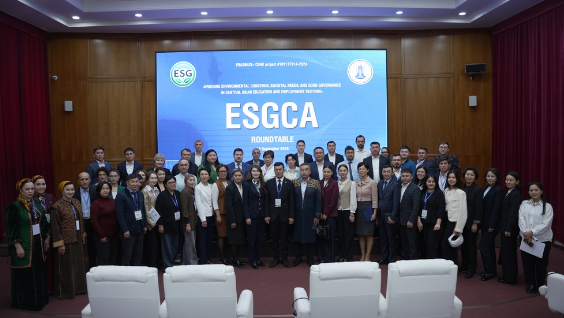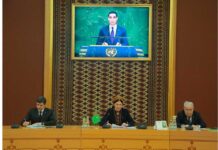Representatives of the Yagshigeldi Kakayev International University of Oil and Gas and the State Energy Institute of Turkmenistan, took part in a four-day business trip to the Academy of Public Administration under the President of Kazakhstan (APA KZ) within the framework of the Erasmus+ “Bridging Environmental concerns, Societal needs, and Good governance in Central Asia education and employment sectors” (ESGCA) project. The visit was organized as part of the international initiative aimed at strengthening environmental, social, and governance (ESG) education across Central Asia, as reported by the education.gov.tm.
The ESGCA project seeks to modernize and enhance environmental education by developing Master’s programs in ESG, along with specialized micro-credit courses. These cover pressing global themes such as climate change, biodiversity conservation, sustainable development, and natural resource management.
The Astana Seminar, held from September 9–12, represented a key activity under Work Package 2 “Development” of the project. It focused on four main tasks like, Establishing Research and Innovation Centers in Central Asian universities; Delivering training from EU universities to benefit local academics; Developing course materials and programs aligned with ESG standards; and Exploiting results of the seminars and round tables to foster regional cooperation.
The Astana sessions were dedicated to environmental challenges and reporting practices in higher education, with an emphasis on applying ESG principles to Central Asian contexts.
Key topics included: ESG and the Green Transition in the EU and Central Asia; Environmental criteria, auditing, and sustainability reporting; Advanced technological solutions for environmental protection; Practical sustainable practices in education and industry; Collaborative group work on mini-ESG strategies for environmental issues.
The seminar gathered 32 official representatives, alongside up to 100 invited stakeholders, including government officials, academics, and business representatives.
A Round Table concluded the event, where participants from universities, enterprises, and public institutions exchanged views on integrating ESG into higher education and professional practice.
The seminar also forms part of a wider series of events under the ESGCA framework. Each session aims to deepen regional cooperation and bring universities closer to international ESG standards. Organizers highlighted several expected benefits of the Astana Seminar for trainees and institutions:
• Greater awareness of environmental sustainability in academic environments;
• Enhanced understanding of environmental reporting practices and global standards;
• Practical guidance for business-academia collaboration on sustainability initiatives;
• Concrete strategies to promote inclusion in Central Asian universities.
Representatives from Turkmenistan actively participated in working sessions, knowledge exchange, and the Round Table discussions. Their contribution emphasized the importance of integrating ESG principles into Turkmen universities’ curricula and strengthening cooperation with European partners on environmental governance. The visit also opened new opportunities for future collaboration between Turkmen higher education institutions and international academic networks, reinforcing the country’s role in regional sustainability initiatives.









